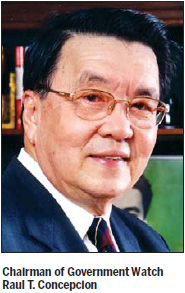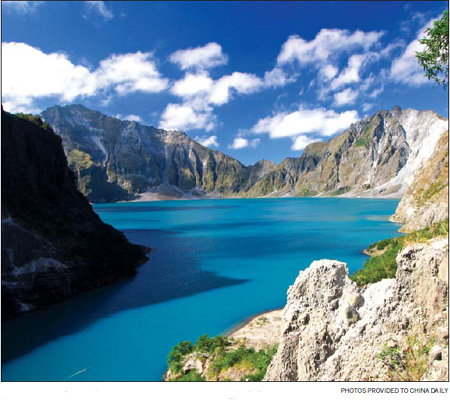Resilient and proud, the Philippines takes off
Updated: 2011-08-03 08:40
(China Daily)
|
|||||||||||
|
Mount Pinatubo is an active stratovolcano located on the island of Luzon. |


With a new, business-friendly administration, the beautiful archipelago is growing fast
A stable economy that has weathered the economic crisis well - gross domestic product grew by a staggering 7.3 percent last year - the Philippines is a country of immense promise.
As well as rising consumer demand, a low dependence on exports and large remittances that flood in from the five million Filipinos working abroad, the Philippines is home to a growing business process outsourcing industry.
In June 2011, the Government of the Philippines' foreign and local currency long-term bond rating was upgraded to Ba2.
An archipelago of 7,000 islands - of which only 11 are inhabited - situated in southeastern Asia, between the Philippine Sea and the South China Sea, the republic of 103 million people has been ruled by head of state and head of government President Benigno S. Aquino III since June 30, 2010.
Committed to good governance and poverty reduction, the Aquino administration has prioritized spending on education, health, and other social programs, putting the onus on the private sector to finance significant infrastructure projects, and more stringent tax collection.
Incentives for business have grown, and in just one year, foreign direct investment grew from 87.5 billion PhP ($2.06 billion) to 116.6 billion PhP, a third of which were from Japan. Some 89 percent of this went to manufacturing. Investment commitments in ICT (information and communications technology) in the fourth quarter of 2010 totaled PhP 23.9 billion, eight times the PhP 3 billion recorded in the same period in 2009.
Value for money
All of which is good news for the country and potential investors. In fact, the Philippines' reputation as a value for money destination has soared in recent years. Not only is it a strategic logistics access point in the ASEAN (Association of Southeast Asian Nations) region, its gross international reserves are at levels above international benchmarks, thanks to strong remittances.
On top of that the country is cost efficient in terms of wages over labor standard expectations and low operational cost, with a vast pool of home-grown talents and highly adaptable resources
The Philippines has a very committed and supportive governance which, in the case of the Board of Investment translates into investor management solutions from prospecting and nurturing investment
In April this year, a high-level Philippine economic delegation visited China to encourage the flow of direct Chinese investments into the Philippines. The Chinese government and business leaders have signaled strong interest in the Aquino administration's PPP (public-private partnership) infrastructure projects in the Philippines worth $12 billion.
This is extremely encouraging, and a large increase on the amount spent last year, which was $100 million.
Fast-growing exports
China has been the fastest-growing export market for Filipino products and services in the past five years and is rapidly becoming the Asia Pacific country's second largest trading partner as Chinese businessmen look forward to identifying new investment opportunities in the country.
Exports reached $51.39 billion in 2010, up 33.69 percent year-on-year, with top exports comprising electrical machinery and equipment, mechanical appliances, ores, copper, minerals, plastics, and electronic goods.
The China-ASEAN Free Trade Agreement, launched on Jan 1, 2010, is the world's largest free trade zone, covering 1.9 billion people with a production value of $6 trillion and a trade volume of $4.5 trillion. As tariff and non-tariff barriers between China and ASEAN countries are slowly removed, the Philippines and China will experience an increase in mutual trade and direct investment.
Strengthening ties with ASEAN countries may also help ease tensions concerning territorial disputes in the South China Sea.
The number of Chinese tourists visiting the Philippines is already doubling year-on-year, and as business interest grows, the new presidency has promised to implement sweeping changes to the way the country is run. Benigno Aquino's administration has vowed to end corruption and improve the country's investment climate to lure more foreign investors, especially from China.
As Liu Jianchao, Chinese ambassador to the Philippines, said: "We work closely with the Filipino-Chinese business community and are proud that they are the main engines of the economic and social development of the Philippines today. The relationship of China and the Philippines is strengthening and I consider this to be the best moment in the history of relations between both countries.
"We welcome the influx of investments from Filipino businessmen, as we believe this is important for the development of the economy of both countries."
China has also provided the ASEAN community, of which the Philippines is a member, with a $1.8 billion loan for the development of infrastructure projects.
Gov't Watch
In the meantime, having learnt from a regime that did little to address poverty and consumer rights, the Filipinos are keen that the Aquino administration abides by its campaign promises and leads with good governance.
An offshoot of the successful Consumer and Oil Price Watch which championed consumer causes and especially with regards to power, fuel, and prices of prime commodities, and pulled for greater communication from power companies, Government Watch (Gov't Watch) has pledged to maintain a position of non-partisanship and objectivity.
The five main pillars include: advocating transparency and accountability in all government undertakings; pushing for revenue enhancement and anti-graft and corruption measures, particularly in the Bureau of Internal Revenue and Bureau of Customs, participate in public hearings of both the senate and the house of representatives, especially as it pertains to fiscal matters and the economy, urge the government to revamp, strengthen and impose sanctions on regulatory bodies, for under compliance of functions, and continue its advocacy on matters that pertain to fuel, power and water.
As Raul T. Concepcion, chairman of Gov't Watch said: "The public looks to us to valide whether any price increases are reasonable. They usually accept any implemented price increase after we explained the reason behind such and the consumers agree that fair pricing with full transparency and disclosure must be the basis for price adjustment.
"We have also been an active participant in various legislative public hearings and policy meetings of different government agencies which we intend to continue during the term of President Aquino."
Offshore destination
In 2010, the National Outsourcing Association (NOA), a non-profit outsourcing organization in the United Kingdom awarded its Offshoring Destination of the Year award to the Philippines.
Its strengths were listed as abundant and quality labor force, stable infrastructure, and unwavering government initiatives.
In particular, the country is swiftly becoming the preferred choice for providing services in the fields of medical transcription, software development and animation.
The NOA made specific reference to the Philippines' greatest resource: its people. Around 450,000 of the 36 million-strong workforce have had college education, and the population's high literacy at 92 percent, puts the country way ahead of other competitors.
Its historic links with the US also mean the Philippines is a potential source of highly skilled English-speaking business process outsourcing (BPO) personnel that Chinese companies can employ.
In the business and tourism province of Cebu, income grew a staggering 10 percent in 2010. With nine economic zones that offer help with company registration and other red tape, good incentives, plus culture of professionalism, Governor Gwendolyn Garcia noted in her State of the Province Address in July that Cebu "remains strong and gets stronger with each passing year."
Thanks to solid bonds between elected officials, business groups, the public and private sectors and the people of the province themsevles, Cebu continues to draw investors. The province has many universities and other educational institutions that serve as a magnet to students from other provinces, a major factor of a highly skilled and efficient workforce in Cebu.
The province will showcase Cebu to the world, when it hosts the 12th East Asia Tourism Forum in September of this year. Delegations from 12 countries, including China and Russia, will come to experience the dynamism, beauty and unique charm that sets Cebu apart.
(China Daily 08/03/2011 page17)
